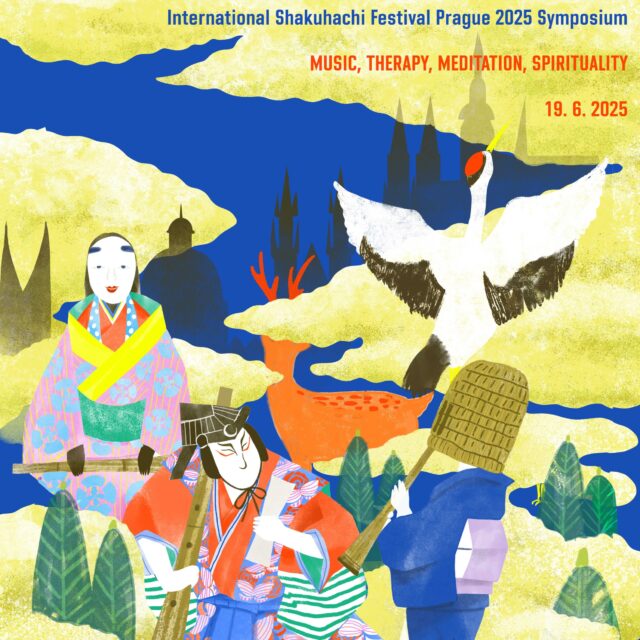International Shakuhachi Festival Prague 2025 Symposium
Organized by NEIRO Association for Expanding Arts in cooperation with the Music Theory Department, Music and Dance Faculty of the Academy of Performing Arts in Prague
One-day conference
June 19th, 2025
Academy of Performing Arts Prague, The Czech Republic
MUSIC, THERAPY, MEDITATION, SPIRITUALITY
Music has been associated with magic, healing, prayer, shamanic practices, meditation, trance, invocation of spirits and other phenomena since the prehistory of mankind. The approach to music as a purely artistic product and as a means of entertainment, relaxation, or aesthetic enjoyment is a relatively young phenomenon and is rather a privilege of Euro-American culture of the last few centuries.
Countless examples of the targeted therapeutic use of music can be found in various traditions around the world. To name a few: ancient Greece, various African-American cults, shamanic practices, the healing trance rituals of the Zár (Ethiopia) or Gnawa (Morocco), etc. The field of music therapy has achieved considerable development in recent decades, both at the institutional level (within various institutes, hospitals, etc.) and in the form of individual sessions. There is extensive new research in this field, with new emerging methods using different musical instruments or voice. The self-therapeutic effects of voice work, drumming and the combination of music and movement are also well known and popular.
The traditions of sacred music have been maintained for centuries/millennia in virtually all world religions and cults, in many forms and styles. However, the evolution of sacred music has not stopped, and in the context of globalization, various traditional expressions are being transferred across the globe to other settings, thus changing both their structure and their purpose and effect. A case in point is the use of overtone singing in the West, brought from Central Asia (especially Tuva and Mongolia), where it is used in secular folk music. In the Western world, however, a new style of spiritual or meditation music has emerged based on this technique (for example the work of David Hykes). Another very distinctive phenomenon is the globalized singing of Indian mantras, which have spread all over the world and are mostly sung in Western adaptation with guitar chordal accompaniment, sometimes in connection with electronic dance music, etc.
In the tradition of the Japanese shakuhachi playing it is said “ichi-on-jo-butsu”, in a single tone – a Buddha. The combination of breath and sound, produced either by voice or wind instruments are widely used in various practices, both in Europe and Asia (i.e. shakuhachi playing as part of spiritual practice both in private and in monasteries as a communal practice).
The effect of music and sound on humans is continuously the subject of a wide range of research, reflections and theories. We ask, for example:
- What are the mechanisms of the therapeutic influence of music on humans? What do current neuro-scientific theories have to say about this?
- What role does music play in different spiritual traditions? What new musical-spiritual phenomena are emerging nowadays?
- What new techniques and approaches does contemporary music therapy bring us? What is the importance of the choice of particular musical instruments or vocal techniques?
These and many other questions are intended to be shared at the ISFP 2025 symposium.conference. We invite music theorists, psychologists, composers, music therapists or performers who have something to say on this topic to submit proposals for their 20-minute presentations, which will then be followed by a 10-minute discussion. If necessary, the presentation can be extended with a musical demonstration of maximum 10 minutes. Abstracts must not exceed 300 words.
About International Shakuhachi Festival Prague
The International Shakuhachi Festival Prague 2025 (ISFP 2025, www.isfp.cz), June 19th to June 23rd, is an event dedicated to cultural and artistic exchange between Japanese and European contemporary music. Over the thirteen years of its existence, it has become an important artistic, networking and educational platform for musicians, composers, scholars and artists. Its long-term goal is to expand its audience perception for sound.
Selected papers with topics falling within the scope of musicology, artistic research, ethnomusicology, organology and music theory will be published upon peer review in Živá Hudba/Living Music Review, the journal of the Music and Dance Faculty of the Academy of Performing Arts in Prague.
Written papers, however, are not mandatory for the symposium presentations.
This symposium will be conducted in English and selcted contributions will be recorded and made available online.
Symposium Committee
- Ing. MgA. Tomáš Reindl, Ph.D., Department of Music Theory, Music and Dance Faculty of the Academy of Performing Arts in Prague
- Mgr. Anna Neuwirthová, Ph.D., Faculty of Arts, University of Ostrava, Member of the Board of the Czech Music Therapy Association (CZMTA) and Representative of CZMTA in the World Federation of Music Therapy (WFMT)
- Anna Matvija M.A., NEIRO Association for Expanding Arts
Symposium Addresses
Symposium website: https://isfp.cz/2025/en/symposium/
Symposium email address: anna@neiro.org
Symposium venue:
Music and Dance Faculty of the Academy of Performing Arts in Prague (HAMU) Orchestral Hall
Malostranské náměstí 258/13
118 00 Prague 1
Czech Republic
Mailing address (not the symposium venue):
NEIRO Association for Expanding Arts z.s.
Holandská 1050/48
101 00 Praha 10 – Vršovice
Czech Republic
